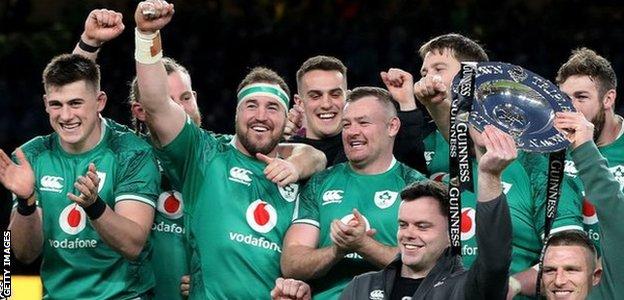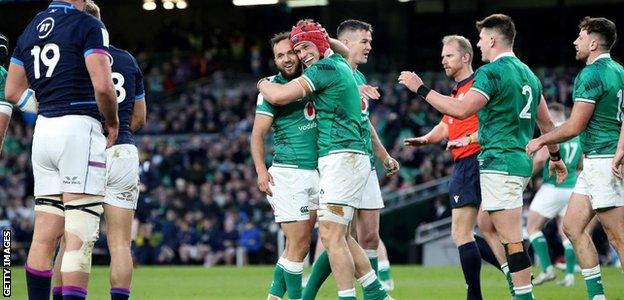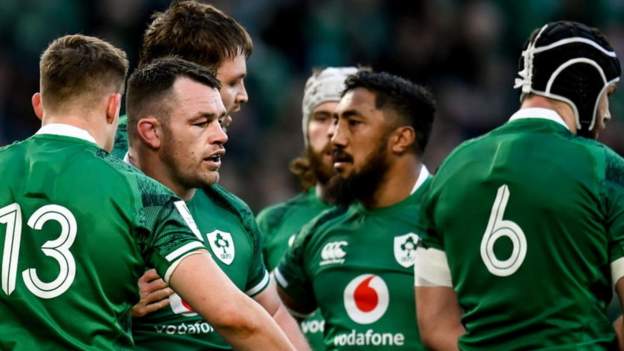Half-joke about Ireland’s autumn clean sweep was shared with nervous laughter and genuine fear.
“They’re going all out to win the Grand Slam next Year, aren’t you?”
Ireland has never reached its peak; they have had short-term success but not sustained.
This isn’t a sign that Ireland has made a desperate effort to win the Grand Slam.
They would prefer to be in France’s shoes. Their task is now to close the significant, but not insurmountable, gulf between Les Bleus and themselves.
The Six Nations Ireland proved to be exactly what their final standings said: the second-best team in the northern half of the hemisphere.
They were not extending the soaring win over New Zealand, but rather a eight-week period of functional work that was generally satisfying and should put them in a position to continue moving forward.
Andy Farrell and Johnny Sexton both made it clear that they believed there was more to be achieved from the current squad and that the destination was far away.
It might seem like those who live within the walls will always affirm that, but that would be wrong.
Sexton provided a reminder earlier in the week of how the team was perceived during last year’s Six Nations. He also shared how he believed they were on the right track at that time.
Ireland demonstrated that they can win, and they did so convincingly in all five games.
Farrell’s team never seemed to be able to win against Scotland, but if Stuart Hogg had given Hugo Keenan an opportunity to save his life, it might have been different.
Ball wasn’t always there to help, their set piece was solid but not infallible. However, they created enough pressure for the desired result and had enough chances to achieve it.
Although it was less comfortable against England in the final week of the championship, Twickenham’s events in the penultimate weeks were similar in that they strengthened Ireland’s ability overcome its imperfections and secure a five point win.

This is by no means a positive result. You can’t say Ireland won four of five matches, but that isn’t to suggest they can compete on the same level with France.
Both the opening matches against England and Wales were good. The second-half revival in Paris was also positive. However, in all instances, the fluid and sometimes irrepressible rugby didn’t keep the course.
All of Ireland’s victories were delivered on a platform not built by an attack, but a miserly defence which was the most successful story of their campaign.
Simon Easterby was promoted to defence coach after the return of Paul O’Connell, who was a huge success in the setup prior to last year’s tournament. Easterby, formerly a back row, has oversaw the development of a system which seeks to suffocate opponents, requiring that the attacker expend more energy than defense.
Only four tries were conceded by Ireland throughout the tournament. France had seven, and Ireland conceded two of those.
While it is true that the numbers are enhanced by the fact that twice the sides had one man (or in Italy’s instance two) sent off early in the contest. However, Farrell has long identified Ireland’s defensive efforts as key to long-term success and have built a system that works at a high standard.
Farrell and Sexton held a post-match press conference in which they discussed their progress with the World Cup next year. This was something that was noteworthy.
They have long resisted the idea that international rugby is based on a four year cycle that almost exclusively focuses on reaching the World Cup in the best shape possible.

Farrell’s strongest side has always been his most available, with the exception of Italy last month.
It was about winning every Test match. They have won 12 of their 13 previous outings.
Three matches in New Zealand during the summer will be a test of Ireland’s positive vibe. A winning record could quickly become a losing streak, if they fall a bit short.
The Six Nations’ inaccuracies and attacks will no longer be tolerated.
This is the challenge for Ireland, who are a formidable team.
But they are not the team to beat.
They are still in the chasing pack but they are closer to the front than they were last year.
